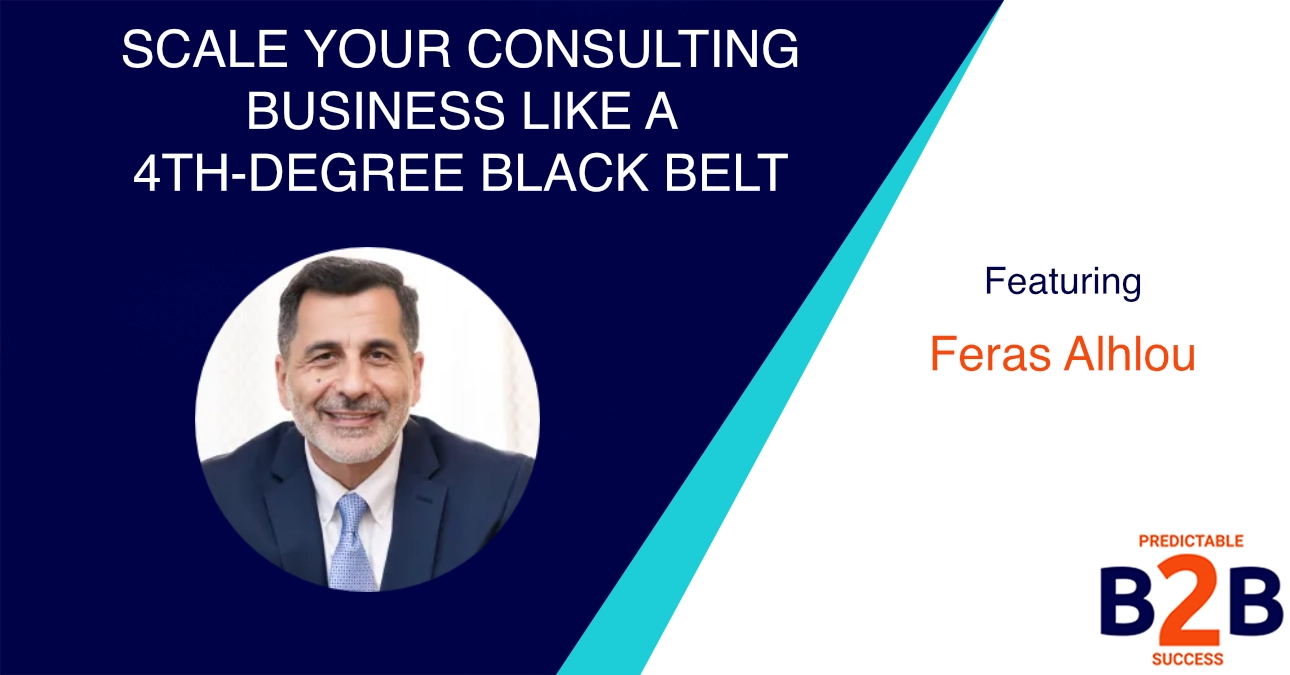Last Updated: November 26, 2024 | Reading Time: 18 minutes

Most consultants chase overnight success formulas. The ones who actually scale to 7-8 figures follow martial arts principles instead.
Key Takeaways
- Scaling takes time: Building a 7-8 figure consulting business typically requires 5-10 years of disciplined practice, not overnight tactics
- Mindset matters most: The shift from freelancer to business owner thinking determines scaling success more than any tactic
- Follow a framework: Progress through 4 distinct stages from $150K to $1M+ with specific milestones and actions at each level
- Relationships trump systems: Your “trust bank account” with clients drives referrals, repeat business, and premium pricing
- Professional services convert higher: Consulting firms average 6-10% conversion rates vs. 2-3% for SaaS, making your positioning critical
Table of Contents
Your consulting business hit $500K. You’re drowning in client work. Every revenue dollar requires another billable hour. Sound familiar?
Here’s the uncomfortable truth: scaling a consulting business is five times harder than most founders think.
But some consultants crack the code. They grow from solo practitioners to 7-figure firms without burning out or sacrificing quality. What separates them from the 90% who plateau?
The answer lies in an unexpected place—the practice hall of a martial arts dojo.
Meet Feras Alhlou: The Consulting Sensei Who Sold His Firm for 8 Figures
Feras Alhlou isn’t your typical business consultant. He’s a 4th-degree black belt in Aikido who’s built and sold multiple companies in Silicon Valley, including a digital marketing consultancy that Dentsu (a global media company) acquired in 2019.
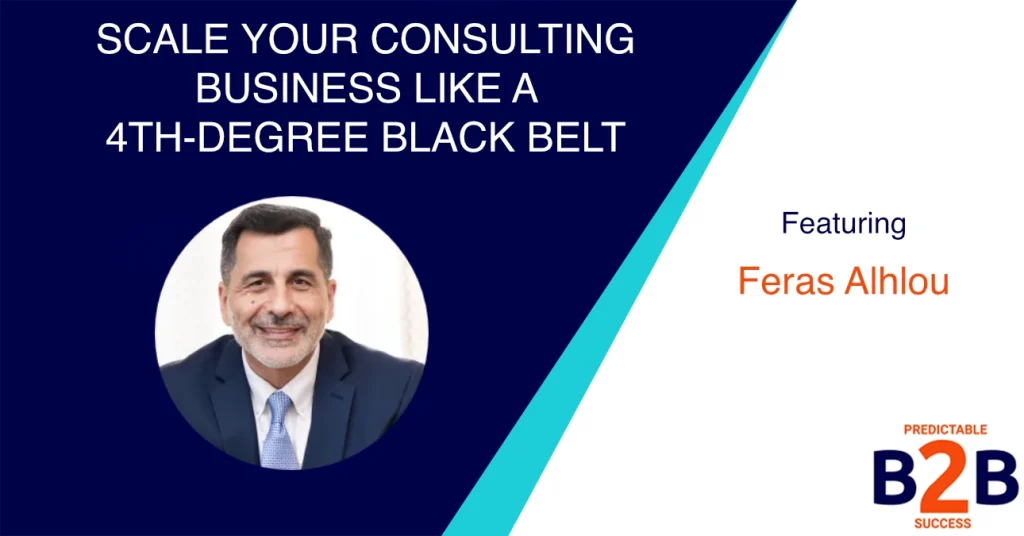
Over two decades, Feras has:
- Founded and exited seven ventures, including an 8-figure sale
- Advised 150+ entrepreneurs on scaling consulting and service businesses
- Driven $65M in sales across his companies
- Applied martial arts discipline to business growth strategies
Today, through Start Up With Feras, he helps early-stage consulting founders avoid the pitfalls that derail growth. His approach? Treat business scaling like earning your black belt—it requires deliberate practice, disciplined execution, and a long-term mindset.
In our conversation on the Predictable B2B Success podcast, Feras shared the exact framework he’s used to repeatedly scale consulting businesses. No fluff. No overnight promises. Just proven strategies that work.
Watch the Full Episode
Listen to Feras share his complete framework for scaling consulting businesses, including real stories from his journey building and selling companies in Silicon Valley.
Why “Hustle Culture” Kills Consulting Businesses
Scroll through LinkedIn. You’ll see it everywhere: “How I scaled to $100K in consulting in 30 days!” These posts rack up engagement. They also create dangerous expectations.
“This is just nonsense. It doesn’t happen. It’s just like winning the lottery. The proven path requires hard work, requires a disciplined mind, requires that deliberate practice.”— Feras Alhlou, 4th-Degree Black Belt & Serial Entrepreneur
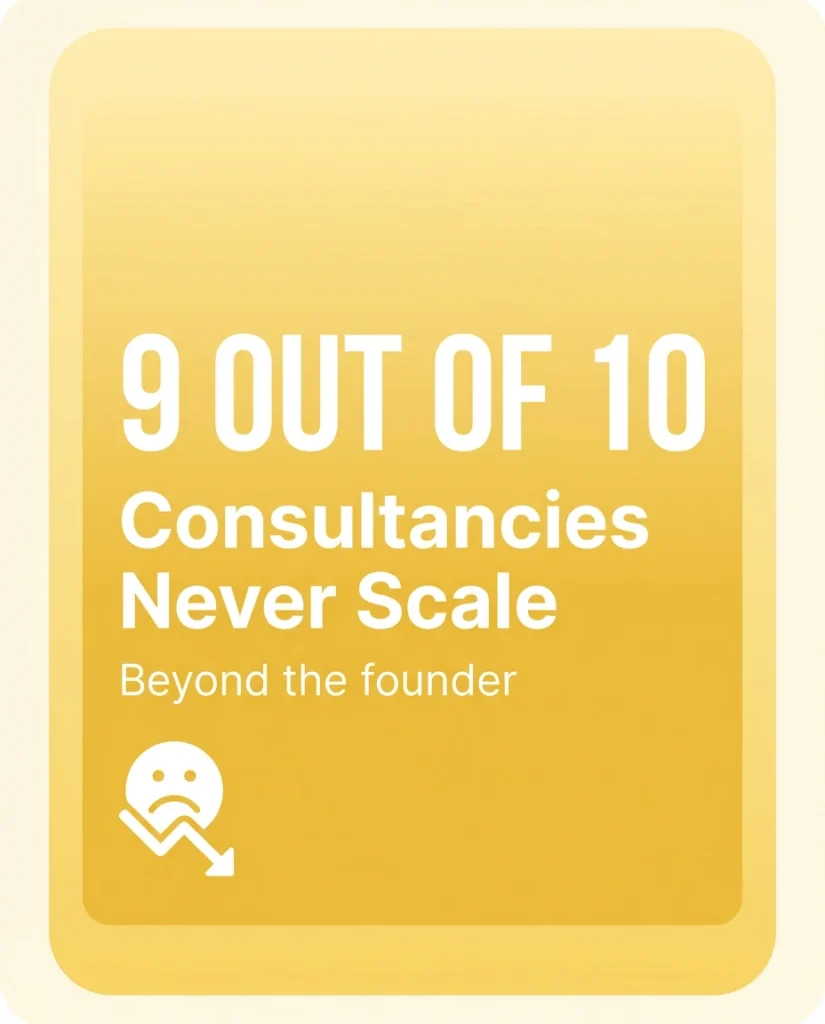
📊 Industry Reality Check: The consulting industry is projected to reach $1.2 trillion by 2025, yet 9 out of 10 consultancies never scale beyond the founder.
Why? Most consultants confuse activity with progress.
They:
- Jump between tactics without commitment
- Avoid investing in systems and people
- Try to handle everything themselves
- Prioritize revenue over profitability
This approach creates what I call the “consultant’s hamster wheel”—more clients, more hours, same revenue ceiling.
Real scaling requires a different mindset. One borrowed from martial arts.
The Black Belt Approach to Scaling Consulting Businesses
Feras is a 4th-degree black belt in Aikido, a Japanese martial art. After 20+ years of practice, he’s discovered striking parallels between martial arts mastery and business growth.
“There are a lot of commonalities… a lot of parallels from any art and even from martial art and business in terms of that deliberate practice, that disciplined mindset. I don’t think you can achieve anything worthwhile in life without working hard.”— Feras Alhlou
Consider how someone earns a black belt:
- They commit to years of consistent practice
- They focus on fundamentals, not flashy techniques
- They learn from masters who’ve walked the path
- They embrace discomfort as part of growth
- They measure progress in months and years, not days
Now apply this to scaling your consulting business. The consultants who reach 7-8 figures follow the same principles. They understand that sustainable growth takes time, discipline, and strategic focus.
Peter Drucker, the father of modern management, once said: “The only sustainable advantage businesses have over their competitors is learning.”
Feras adds his own interpretation: “Learning in my mind is education and application. So you have to learn and then take what’s good and apply it to your business.”
This combination—disciplined execution plus continuous learning—forms the foundation of the Black Belt Scaling Framework.
The 3 Critical Mindset Shifts for Scaling Past $500K
Before tactics come mindset. Most consultants plateau because they’re still thinking like freelancers, not business owners.
Shift #1: From Overnight Success to Deliberate Practice
Feras was “forced into entrepreneurship” after a 2003 layoff. For two months, he sent resumes daily. No interviews. Zero offers.
“It was a pretty horrific event in my career,” he recalls. “People who have gone through layoffs can relate to that experience. It hurts across every aspect, psychologically, emotionally, relationship-wise.”
But instead of chasing quick wins, Feras committed to building skills methodically. He had zero sales background but learned through consistent practice. Twenty years later, he’d built and sold seven ventures.
The lesson? “Success breeds success. You start getting better at things, you start getting better results, and that feeds back positive energy to do more of it.”
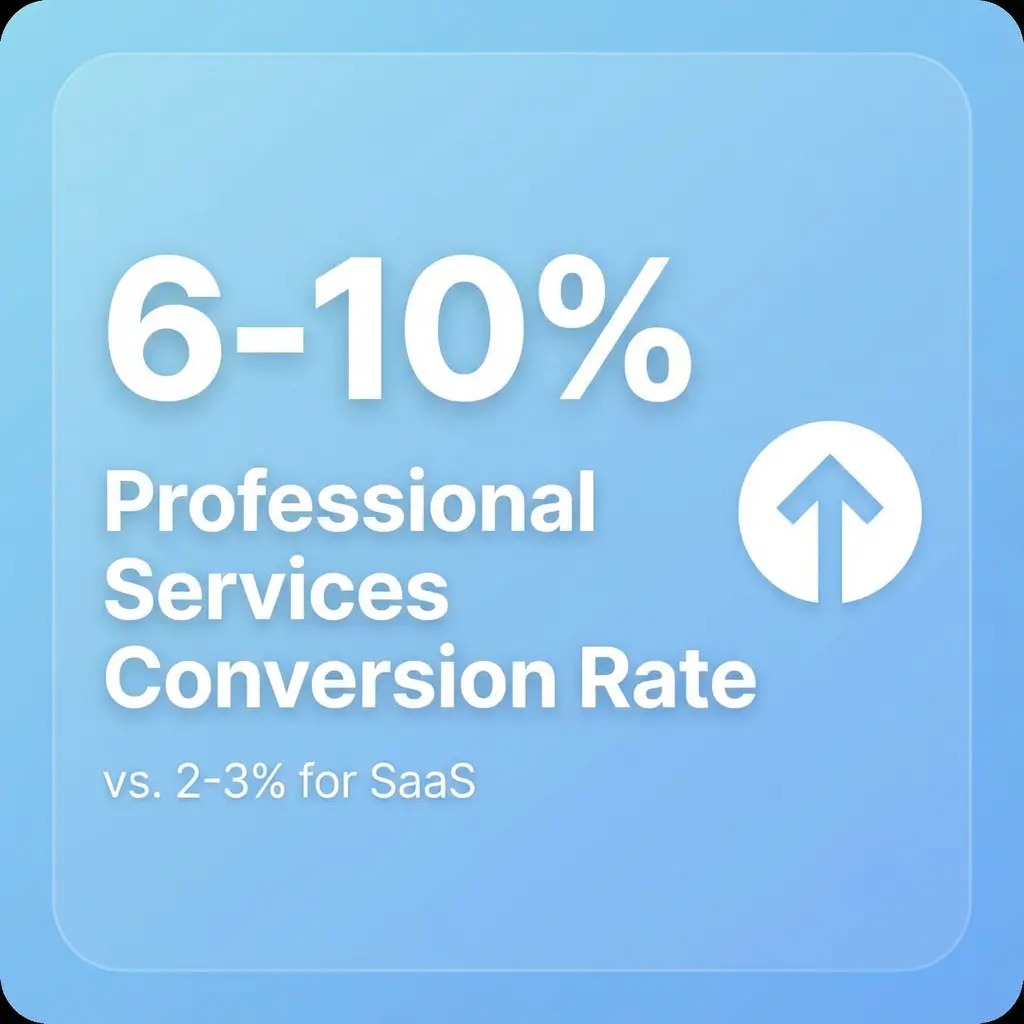
💡 Conversion Rate Advantage: Professional services and consulting firms average 6-10% conversion rates—significantly higher than the 2-3% typical for SaaS. Why? Consultants who invest time building expertise and reputation create compounding advantages.
Shift #2: From Selling Hours to Delivering Outcomes
Early-stage consultants sell time. Mature consulting businesses sell transformation.
This shift unlocks pricing power. When you’re no longer bound by hourly rates, your revenue ceiling lifts dramatically.
Consider two consultants:
- Consultant A: Charges $200/hour, works 40 billable hours/week = $416K/year
- Consultant B: Charges $50K for a 90-day transformation package, closes 10 clients/year = $500K/year with less delivery time
Consultant B has room to scale. Consultant A hit their ceiling.
The key? Frame your services around the value you create, not the time you spend. As we explored in our article on B2B growth marketing, the most successful firms answer three questions relentlessly: “What are we selling? Who is it for? Why should they care?”
Shift #3: From Solo Execution to Strategic Delegation
“I think the part about that disciplined mind and deliberate practice is really important. Starting a company, growing a company… if you’re a manager in a company and you want the next promotion, you have to have that discipline.”— Feras Alhlou
But discipline doesn’t mean doing everything yourself.
The biggest trap? Believing no one can deliver quality like you can. This mindset keeps you trading time for money forever.
Successful delegation starts with recognizing your highest-value activities. Your job isn’t to execute every task perfectly. It’s to ensure clients achieve their desired outcomes through the right combination of strategy, process, and execution.
The 4-Stage Framework: From $150K to $1M+ (Without Burning Out)

Based on analyzing multiple consulting business models and Feras’s direct experience, here’s the proven path to scale:
Stage 1: Foundation ($150K-$250K)
Primary Focus: Optimize before expanding
At this stage, you have 1-2 anchor clients and consistent work. But you’re doing everything yourself—client delivery, marketing, operations, accounting.
Key actions:
- Clarify your positioning around a specific niche
- Document your processes and create templates
- Build a basic client acquisition system (not just referrals)
- Track your numbers weekly (revenue, expenses, pipeline)
Remember Feras’s emphasis on learning: “If you’re not learning new things… if you’re not looking at market trends… if you’re not learning, I don’t think you can grow.”
This stage is about building the muscle memory that enables future scaling. Similar to developing an agile mindset, you’re creating the foundation for rapid iteration and improvement.
Stage 2: Systematization ($250K-$500K)
Primary Focus: Prepare for delegation
You’re past survival mode. Revenue is steady. But you’re at capacity. Every new client means working nights or weekends.
⚠️ Founder Challenge: Feras notes that 70% of founders don’t come to business with sales and marketing backgrounds. They’re experts in their craft but haven’t built the systems to scale.
Key actions:
- Create your first hire roadmap (start with operations/admin)
- Build Standard Operating Procedures (SOPs) for recurring tasks
- Implement a CRM to manage leads and client relationships
- Develop your signature methodology or framework
- Start investing in content marketing for inbound leads
At this stage, consider productizing some services. As highlighted in research on consulting business scaling strategies, packaging expertise into repeatable offers can dramatically improve efficiency and profitability.
Stage 3: Expansion ($500K-$750K)
Primary Focus: Strategic delegation and team building
This is the inflection point. You’re hiring your first team members or contractors. The business can’t run on your personal effort anymore.
“Sales and business is all about relationships. The more you invest in building this trust bank account… the more you deposit in this emotional bank account, the more you can get away with in the future when you need to withdraw.”— Feras Alhlou
Key actions:
- Hire specialists for delivery work you’ve systematized
- Build a contractor network for overflow capacity
- Develop multiple service offerings for client expansion
- Create a formalized sales process with defined stages
- Invest in marketing automation and lead nurturing
📈 System Impact: Consulting firms that implement systematic CRM processes see conversion rates 20-30% higher than those without structured systems.
Stage 4: Optimization ($750K-$1M+)
Primary Focus: Business owner mindset
You’re no longer the primary delivery person. Your role shifts to strategy, business development, and team leadership.
This requires the final mental shift—from consultant to CEO. As explored in our guide on the 7 critical elements of scaling, sustainable growth at this level demands focusing on high-leverage activities only you can do.
Key actions:
- Build a leadership team (operations manager, sales lead, delivery lead)
- Develop multiple revenue streams (training, licensing, productized services)
- Create systematic growth channels beyond referrals
- Focus your time on strategic partnerships and major deals
- Consider exit planning or expansion opportunities
Feras’s journey exemplifies this path. He didn’t just build one successful consultancy—he built seven. Each time, he applied lessons learned, refined his systems, and focused on creating businesses that could run without him at the center.
The Trust Bank Account: Why Relationships Trump Tactics
Here’s where most scaling advice falls short. It focuses on systems and tactics while ignoring the fundamental driver of consulting growth: relationships.
Feras shared a powerful story about a client from years ago. A director at an international beauty brand worked with his agency on an analytics project. Years later, after moving to a new company, that director still remembered how Feras’s team “took care of him in the old days” and invited them to bid on a major RFP.

“Take care of the customer, bend over backward for them. I think it will pay off in so many different ways. Plus, it’s your reputation at the end of the day.”— Feras Alhlou
This concept—what Steven Covey calls the “emotional bank account”—creates compounding returns:
- Happy clients refer new business (acquisition cost = $0)
- Long-term clients buy additional services (expansion revenue)
- Strong relationships shorten sales cycles (higher close rates)
- Your reputation attracts better clients (premium pricing)
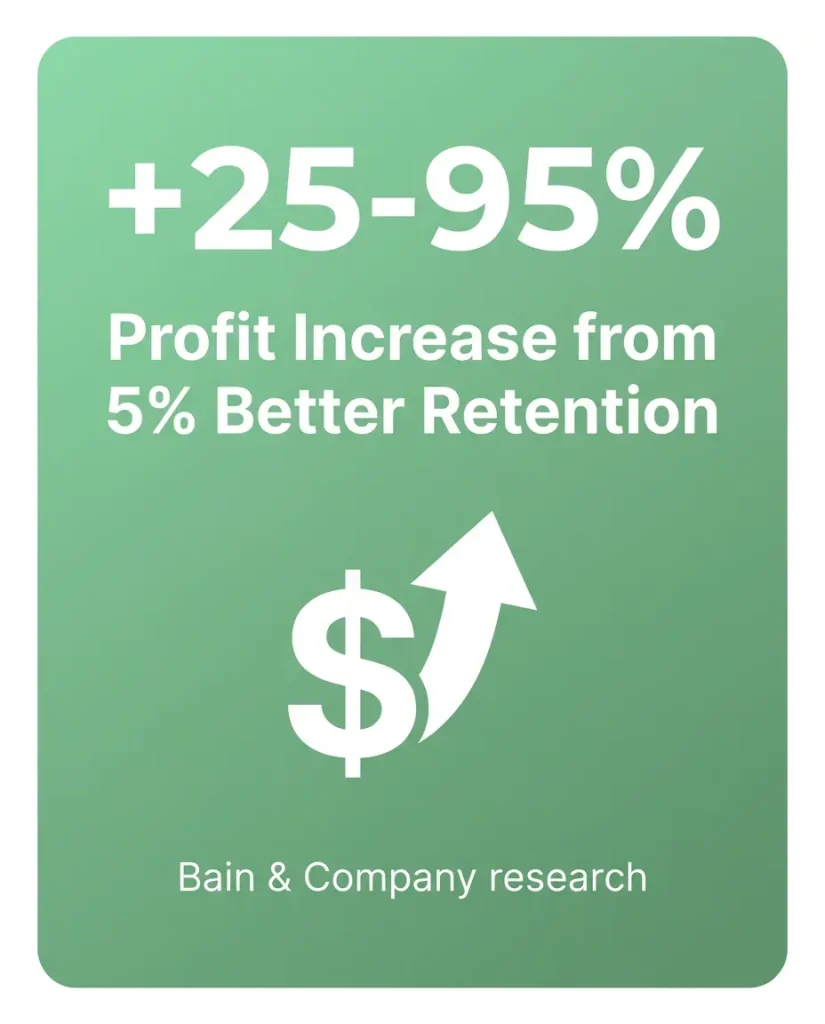
💰 Retention ROI: Increasing customer retention rates by just 5% can increase profits by 25% to 95%. In consulting, acquiring a new customer can cost up to 5 times as much as retaining an existing one.
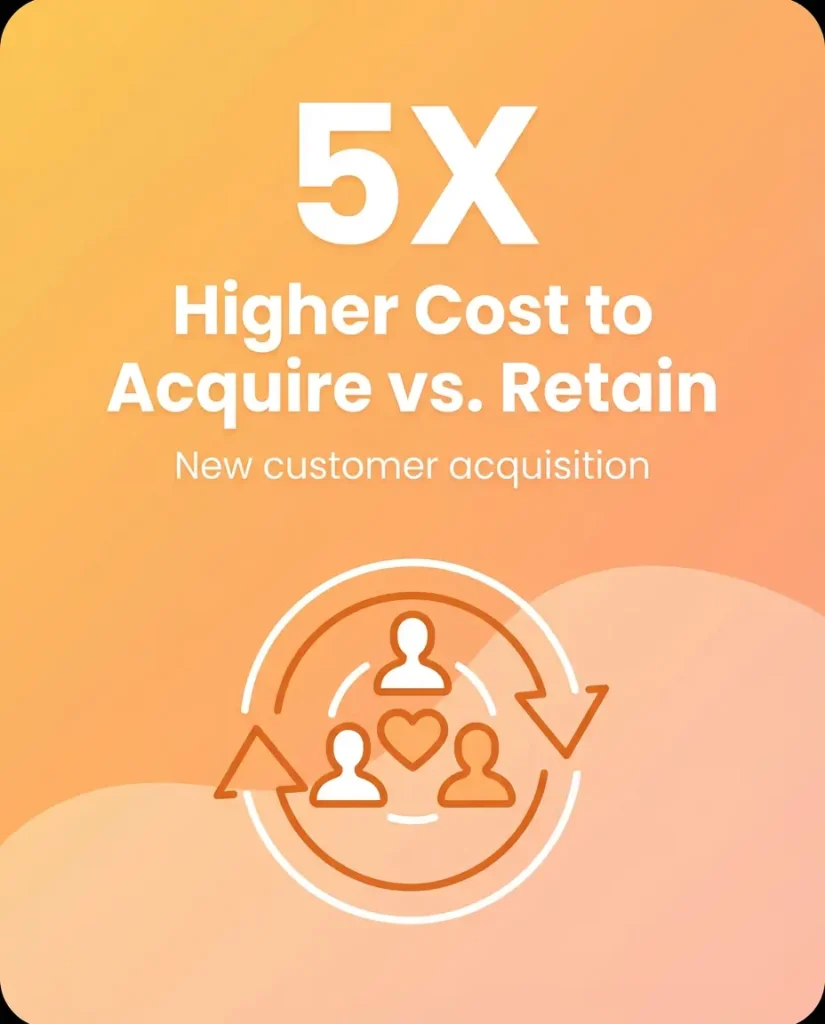
“Sales is not a dirty word,” Feras explains. “We are helping them out. If you really care about their bottom line, you bend over backward for them… nine out of ten times, they’ll reciprocate and come back to you.”
This relationship-first approach underpins every stage of scaling. It’s why ghostwriting educational content for B2B tech executives works so well—it builds trust at scale. By consistently demonstrating expertise through strategic content, you create the foundation for long-term client relationships that fuel sustainable growth.
Common Scaling Mistakes That Kill Consulting Businesses
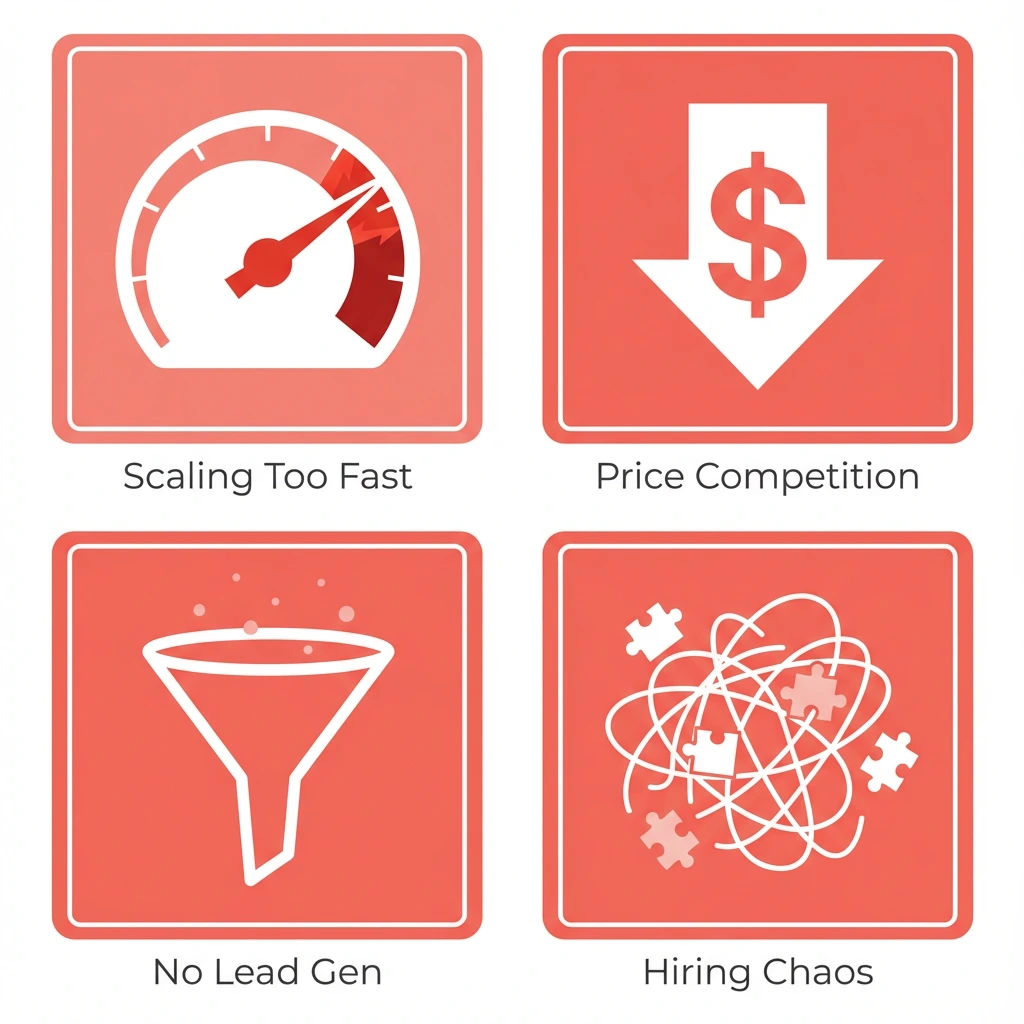
Even consultants who understand the fundamentals make costly mistakes. Here are the most common traps:
Mistake #1: Scaling Too Fast Without Infrastructure
Adding clients before you have systems creates chaos. You burn out. Quality suffers. Clients leave.
According to Consulting Success research, the biggest mistake is “trying to scale too fast without building proper infrastructure first.” Most scaling investments require 6-12 months to generate positive ROI.
“There are seasons in your life where you have time and you’re healthy. Put it into something meaningful. Work hard initially, especially initially. The trajectory of your career will be significantly different.”— Feras Alhlou
Mistake #2: Competing on Price Instead of Value
When consultants lack confidence in their positioning, they default to competing on price. This creates a race to the bottom.
Professional services that charge premium rates convert at higher percentages because they attract committed buyers. As we covered in our analysis of marketing frameworks, your pricing signals your value proposition.
Mistake #3: Neglecting Lead Generation Systems
Relying solely on referrals works until it doesn’t. Then you’re in feast-or-famine cycles.
Feras addresses this directly: “For those who are entrepreneurs, want to be entrepreneurs… we provide a lot of free content on helping early-stage entrepreneurs… how to market, how to sell, how to learn these skills.”
📊 Diversification Impact: B2B service businesses that diversify their lead sources see 40% more stable revenue than those dependent on a single channel.
Mistake #4: Hiring Before Systematizing
You can’t delegate chaos. If you don’t have documented processes, your first hires will struggle. You’ll spend more time managing them than doing the work yourself.
The solution? Create SOPs before you hire. As discussed in strategies for scaling business operations, effective delegation starts with clear systems and defined outcomes.
Deliberate Practice: The Discipline Behind Sustainable Growth
“We’re so distracted these days. In my days when I started, there wasn’t YouTube, no social media, so we had to learn things from CDs… but it was hard to get access to things. Now, I feel in a way bad for those who are starting because there’s too much information. Who do I listen to? Who do I learn from? And there are so many distractions.”— Feras Alhlou
The antidote? Deliberate practice—the intentional, focused effort to improve specific skills.
In martial arts, deliberate practice means:
- Repeating basic techniques thousands of times
- Getting immediate feedback from instructors
- Progressively increasing difficulty
- Maintaining focus despite discomfort
In consulting, it looks like:
- Refining your sales pitch after every client conversation
- Analyzing which marketing channels drive qualified leads
- Improving project scoping to reduce scope creep
- Building systems that make each delivery more efficient
“I think you have to have that discipline,” Feras emphasizes. “These are what I want to do. I want to get my black belt in karate, whatever. So it takes time. It does take practice. It does take sacrifice.”
Most consultants dabble. They try a tactic for a month, see no results, and jump to something else. Black belt consultants commit to a strategy for 6-12 months, measure results systematically, and refine based on data.
This mirrors the approach successful founders take to scaling with Brett Trainor’s 3-part playbook—consistent execution, measurement, and iteration.
Investing in Learning: The Only Sustainable Advantage
Feras is on his seventh venture. Each one built on lessons from the previous. This continuous learning created his competitive advantage.
“The only sustainable advantage businesses have over their competitors is learning. Learning in my mind is education and application.”— Feras Alhlou, quoting Peter Drucker
Notice the second part: application.
Information alone doesn’t create results. Consuming podcasts, reading books, and attending conferences feels productive. But without application, it’s just entertainment.
Here’s how to operationalize learning in your consulting business:
- Set quarterly learning goals: Choose one skill to develop each quarter (e.g., “Improve close rate from 30% to 40%”)
- Find practitioners, not theorists: Learn from people who’ve actually scaled consulting businesses, like Feras
- Create feedback loops: Track metrics that reveal whether you’re improving
- Share what you learn: Teaching others forces deeper understanding
- Apply immediately: Don’t wait to have perfect knowledge—test and refine
This investment in learning extends to understanding market dynamics. As covered in our deep dive on creating personas that boost growth, the best consultants continuously deepen their understanding of client needs, market shifts, and emerging opportunities.
AI and Technology: Amplifying Strategy, Not Replacing Judgment
Let’s address the elephant in the room: AI.
Many consultants fear AI will commoditize their services. The reality? AI amplifies strategic thinking for those who know how to use it.
According to recent analysis, AI gives consultants competitive advantages in:
- Research and insights (analyzing industry trends faster)
- Proposal creation (crafting more compelling pitches)
- Client communication (automated follow-ups that feel personal)
- Content production (scaling thought leadership)
But AI can’t replace the core value consultants provide: judgment, experience, and strategic thinking developed through years of practice.
Feras’s approach illustrates this. His Black Belt Startup Framework isn’t about automating consulting—it’s about building the foundation, methodologies, and mindset that make scaling possible. Technology enhances execution, but human expertise drives results.
Smart consultants use AI to handle repetitive tasks, freeing time for high-value client work. As we explore in our article on best practices in business, technology should enable your strategy, not define it.
When to Pivot Your Business Model (And When to Stay the Course)
Not every consulting business should follow the same scaling path. Three distinct models exist, each with different advantages:
| Business Model | Description | Advantages | Challenges |
|---|---|---|---|
| The Firm Model | Hire consultants to deliver projects under your direction. You take a percentage of their billings. | Fastest scaling, predictable delivery, clear succession plan | Management overhead, quality control, people management skills required |
| The Productized Model | Package your expertise into repeatable programs, courses, training, or software. | Leveraged income, minimal delivery time, passive revenue potential | Upfront investment, marketing-heavy, different skillset required |
| The Customized Model | Stay solo but charge premium rates for highly specialized, white-glove service. | Maximum control, premium pricing, deep client relationships | Income ceiling, can’t scale beyond your hours, vacation = no revenue |
Feras built firms and eventually sold one for 8 figures. But the right model depends on your goals, lifestyle preferences, and strengths.
“I think there’s a way to do it with finesse. There’s a way to do it where you really care for the client. You want to take care of them, and at the same time, you want to make a lot of money. I don’t see this as… there’s no tension there.”— Feras Alhlou
The key? Choose a model aligned with how you want to spend your time. Then commit fully. As Feras learned through martial arts: “You have to have that discipline. I wanna learn how to ride horses. Whatever it is, it does take practice. It does take time. It does take sacrifice.”
Your Next 90 Days: The Black Belt Scaling Action Plan
Knowledge without action is useless. Here’s your 90-day plan to start scaling like a 4th-degree black belt:
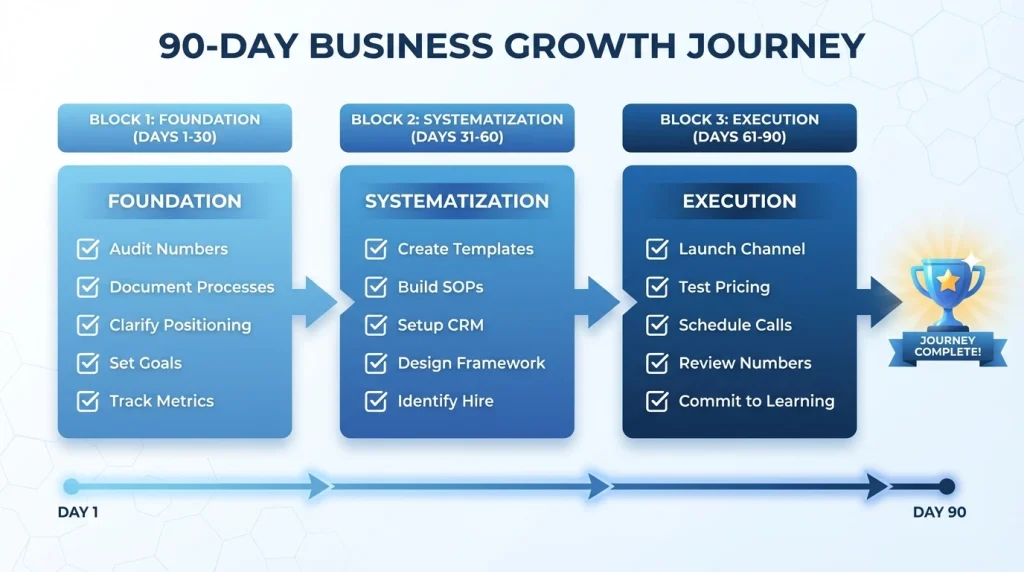
Days 1-30: Foundation
- ☐ Audit your current numbers (revenue, profit margins, client acquisition cost)
- ☐ Document your top 3 most valuable processes
- ☐ Clarify your positioning statement (who you serve, what transformation you deliver)
- ☐ Set your 12-month revenue goal and reverse-engineer required clients
- ☐ Start tracking weekly metrics in a simple dashboard
Days 31-60: Systematization
- ☐ Create templates for your most common deliverables
- ☐ Build your first SOP for client onboarding
- ☐ Set up a basic CRM (even a spreadsheet works initially)
- ☐ Design your signature methodology or framework
- ☐ Identify your first potential hire or contractor role
Days 61-90: Execution
- ☐ Launch one systematic lead generation channel (content, outreach, partnerships)
- ☐ Test pricing on your next 3 proposals (aim 20% higher)
- ☐ Schedule 5 conversations with people who’ve scaled consulting businesses
- ☐ Review your numbers and adjust your 12-month plan
- ☐ Commit to one learning investment (course, coaching, mastermind)
“There are seasons in your life, especially for the younger folks, where you have time and you’re healthy. So put it into something meaningful.”— Feras Alhlou
This 90-day sprint isn’t about perfection. It’s about building momentum through deliberate practice. As we explored when analyzing how to build a company brand and scale, consistent action compounds over time.
The Ugly Truth About Entrepreneurship (That No One Tells You)
Let’s end with honesty.
“Entrepreneurship is hard. I always say it’s five times harder than most people think.”— Feras Alhlou
Building a 7-8 figure consulting business requires:
- Working 60-70 hour weeks (initially)
- Sacrificing hobbies and social time
- Managing constant uncertainty
- Dealing with difficult clients
- Making payroll during slow months
- Facing rejection repeatedly
This isn’t meant to discourage you. It’s meant to prepare you.
When Feras was laid off in 2003, he experienced it as “horrific.” He couldn’t find work for months. But that forced pivot led to building seven companies and a life he designed on his terms.
“A lot of us who have done something worthwhile got a whole lot of help along the way,” Feras reflects. “There is no self-made anyone normally… a lot of people help me along the way, and this is my way of giving back.”
The consultants who scale successfully don’t do it alone. They find mentors, join communities, invest in coaching, and continuously seek people further along the path.
They also maintain perspective. Feras practices Aikido, hikes with family, and deliberately creates time for life outside work. Balance isn’t just nice to have—it’s essential for sustained high performance.
As we explored in our conversation with experts on scaling creative businesses, preserving what makes your work meaningful while growing is the ultimate challenge.
Final Thoughts: Earn Your Black Belt
Earning a black belt takes 5-10 years of consistent practice. Building a 7-8 figure consulting business takes similar dedication.

Most consultants quit too early. They chase overnight success formulas, jump from tactic to tactic, and burn out before reaching their potential.
The ones who make it? They treat business like a martial art:
- They commit to the long game
- They practice fundamentals relentlessly
- They learn from masters
- They embrace discomfort as growth
- They measure progress in years, not months
“If you’re not learning, I don’t think you can grow. Learning is education and application. You have to learn and then take what’s good and apply it to your business.”— Feras Alhlou
The framework is clear. The path is proven. The question is: Are you willing to put in the deliberate practice required to earn your black belt in business?
Scaling a consulting business isn’t complicated. But it is hard.
Five times harder than most people think.
And absolutely worth it.
Ready to Scale Your Consulting Business?
At Sproutworth, we help B2B tech consultants and service providers scale through strategic content that builds trust at scale. Our ghostwriting services create educational email courses, strategic newsletters, and LinkedIn thought leadership that position you as the go-to expert in your niche—without the time investment of doing it yourself.
Schedule a consultation to explore how strategic content can accelerate your consulting business growth.
Frequently Asked Questions About Scaling a Consulting Business
How long does it take to scale a consulting business to 7 figures?
Typically, scaling a consulting business from startup to 7 figures takes 5-10 years of disciplined practice and systematic growth. While some achieve it faster through acquisitions or unique market timing, the proven path requires building systems, delegating effectively, and maintaining consistent client acquisition. Feras Alhlou built and sold seven companies over 20 years, with each venture benefiting from lessons learned in previous ones. Most scaling investments require 6-12 months to generate positive ROI, so patience and commitment are essential.
What are the biggest mistakes when scaling a consulting business?
The four most common scaling mistakes are:
- Scaling too fast without building proper infrastructure first leads to burnout and quality issues.
- Competing on price instead of value, which commoditizes your services.
- Neglecting to build systematic lead generation channels beyond referrals, creating feast-or-famine revenue cycles, and
- Hiring before systematizing your processes means you’re delegating chaos rather than clarity.
The key is to optimize and systematize before expanding.
Should I hire employees or use contractors when scaling my consulting business?
Start with contractors for delivery and specialized tasks, then hire full-time employees for operations and administrative functions. Contractors offer flexibility and lower risk while you build predictable revenue. Your first full-time hire should typically be an operations manager or administrative assistant who handles scheduling, client communication, and basic coordination. Once you have systematized processes and consistent revenue, you can hire full-time consultants for delivery work. The progression is: solo → contractors → operations hire → delivery team → leadership team.
What’s the difference between productized and customized consulting models?
The productized consulting model packages your expertise into repeatable programs, courses, or standardized services with fixed pricing and defined deliverables. This allows you to serve multiple clients simultaneously with minimal customization. The customized model offers bespoke, white-glove service tailored to each client’s unique situation, commanding premium pricing but limiting your capacity. Productized models scale faster and create passive income potential, while customized models maintain maximum control and deeper client relationships. Many successful consultants use a hybrid approach, offering both standardized and custom options.
What conversion rates should consulting businesses expect?
Professional services and consulting firms average 6-10% conversion rates, significantly higher than the 2-3% typical for SaaS companies. This advantage comes from the relationship-based nature of consulting and the high-touch sales process. Firms with systematic CRM processes see conversion rates 20-30% higher than those without structured systems. The key to achieving above-average conversion rates is building trust through thought leadership, maintaining consistent follow-up, and positioning your services around transformation rather than time.
How do I know which consulting business model is right for me?
Choose your business model based on three factors: your lifestyle goals, your strengths, and your desired time investment. The firm model works best if you enjoy leadership and business development more than hands-on delivery. The productized model suits you if you want leveraged income and minimal delivery time, but are willing to invest heavily in marketing. The customized model is ideal if you want maximum control, enjoy deep client work, and are comfortable with an income ceiling tied to your personal capacity. Consider your 5-year vision: Do you want to build a sellable asset, create passive income, or maintain boutique excellence?
What role does AI play in scaling a consulting business?
AI amplifies strategic thinking rather than replacing human judgment in consulting. Smart consultants use AI for research and insights (analyzing trends faster), proposal creation (crafting compelling pitches), client communication (automated follow-ups that feel personal), and content production (scaling thought leadership). However, AI cannot replace the core value consultants provide: judgment, experience, and strategic thinking developed through years of practice. Use AI to handle repetitive tasks, freeing up your time for high-value client work that requires human expertise and relationship-building.
How important is client retention for consulting business growth?
Client retention is critical for profitable scaling. Research shows that increasing retention rates by just 5% can increase profits by 25% to 95%. Acquiring a new customer costs up to 5 times as much as retaining an existing one. Feras Alhlou emphasizes building a “trust bank account” with clients by consistently over-delivering and genuinely caring about their outcomes. Long-term clients provide referrals (zero acquisition cost), buy additional services (expansion revenue), and create shorter sales cycles for new offerings. Your retention rate directly impacts your ability to scale profitably.
Related Resources from Sproutworth
Continue your journey to scaling success with these expert insights from the Predictable B2B Success podcast:
- How to Use An Agile Mindset to Scale Your Startup Growth – Discover how adaptability and continuous learning drive consulting business success
- How to Scale a Business Successfully: Top 10 Tips – Learn the essential strategies for beating the odds and growing sustainably
- The Best Ways to Scale Your Business with a 3-Part Playbook for Growth – Brett Trainor’s proven framework for reaching the million-dollar milestone
- How To Scale Business Operations To Drive Growth Quickly – Systemize your operations before you try to scale
- Scaling Creative Businesses: Data Backed Strategies for 20%+ Growth – Balance artistic vision with business scaling strategies
- Marketing Frameworks: 9 Must-Know Frameworks That Drive Growth – Master the frameworks that accelerate consulting business growth
Connect with Feras Alhlou
Continue learning from Feras and access his free resources for consulting entrepreneurs:
- Website: Start Up With Feras
- LinkedIn Profile: Feras Alhlou on LinkedIn
- Company LinkedIn: Start Up With Feras Company Page
- YouTube Channel: Start Up With Feras YouTube
- X/Twitter: @ferasa on Twitter
Feras offers pro bono consulting hours each week to help entrepreneurs. Visit his website to learn more about his coaching, courses, and consulting services.
Sources and Research
This article draws on extensive research and expert interviews, including:
- Feras Alhlou, Predictable B2B Success Podcast Interview
- How to Scale Your Consulting Business to $1M (And Beyond) – Consulting Success
- How to Scale a Consulting Business in 2025 – MindK
- B2B Sales Conversion Rate by Industry 2025 – SERPsculpt
- Average Conversion Rate by Industry and Marketing Source 2025 – Ruler Analytics
- Effective Scaling Strategies for Smaller Consulting Firms – Kantata
- How To Scale A Consulting Service Business – Scaling With Systems
- How to Scale A Consulting Business – ClickUp
- 3 Strategies to Scale Beyond Your 7-Figure Consulting Business – GrowthForce
- B2B Conversion Rates By Industry – 2025 – First Page Sage
Some areas we explore in this episode include:
Listen to the episode.
Subscribe to & Review the Predictable B2B Success Podcast
Thanks for tuning into this week’s Predictable B2B Podcast episode! If the information from our interviews has helped your business journey, please visit Apple Podcasts, subscribe to the show, and leave us an honest review.
Your reviews and feedback will not only help me continue to deliver great, helpful content but also help me reach even more amazing founders and executives like you!
